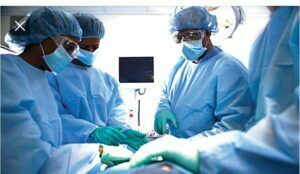A Newly Designed Technology Currently used to Restore cell, Organ Functions After Death.
Within minutes of the final heartbeat, a cascade of biochemical events triggered by a lack of blood flow, oxygen, and nutrients begins to destroy a body’s cells and organs. A newly designed Technology which can restore dead cell.
A team of scientists has found this massive and permanent cellular failure doesn’t have to happen so quickly.
Using a new technology they developed, which delivers a specially designed cell-protective fluid to organs and tissues . The researchers restored blood circulation and other cellular functions in pigs a full hour after their deaths.
Share
The Details:
Within minutes of the final heartbeat, a cascade of biochemical events triggered by a lack of blood flow, oxygen, and nutrients begins to destroy a body’s cells and organs. But a team of Yale scientists has found that massive and permanent cellular failure doesn’t have to happen so quickly.
Using a new technology they developed that delivers a specially designed cell-protective fluid to organs and tissues, the researchers restored blood circulation and other cellular functions in pigs a full hour after their deaths, they report in the Aug. 3 edition of the journal Nature.
The findings may help extend the health of human organs during surgery and expand availability of donor organs, the authors said.
“All cells do not die immediately, there is a more protracted series of events,” said associate research scientist in neuroscience at Yale School of Medicine and co-lead author of the study. “It is a process in which you can intervene, stop, and restore some cellular function.”
The research builds upon an earlier Yale-led project that restored circulation and certain cellular functions in the brain of a dead guinea pig with technology dubbed Brain Ex. Published in 2019, that study and the new one were led by the lab of Yale’s Nenad Sestan, the Harvey and Kate Cushing Professor of Neuroscience and professor of comparative medicine, genetics, and psychiatry.
“If we were able to restore certain cellular functions in the dead brain, an organ known to be most susceptible to ischemia [inadequate blood supply], we hypothesized that something similar could also be achieved in other vital transplantable organs,” Sestan said.
In the new study — which involved senior author Sestan and colleagues all from Yale. The researchers applied a modified version of BrainEx called OrganEx to the whole pig. The technology consists of a perfusion device similar to heart-lung machines — which do the work of the heart and lungs during surgery — and an experimental fluid containing compounds that can promote cellular health and suppress inflammation throughout the pig’s body. Cardiac arrest was induced in anesthetized pigs, which were treated with OrganEx an hour after death.
Six hours after treatment with OrganEx, the scientists found that certain key cellular functions were active in many areas of the pigs’ bodies — including in the heart, liver, and kidneys — and that some organ function had been restored. For instance, they found evidence of electrical activity in the heart.
“We were also able to restore circulation throughout the body, which amazed us.
Normally when the heart stops beating, organs begin to swell, collapsing blood vessels and blocking circulation, he said. Yet circulation was restored and organs in the deceased pigs that received OrganEx treatment appeared functional at the level of cells and tissue.
“Under the microscope, it was difficult to tell the difference between a healthy organ and one which had been treated with OrganEx technology after death.A newly designed Technology
Read alsohttps://educationalhealthynews.com/opinions/ghana-to-present-its-commitments-on-skills-for-learning/
As in the 2019 experiment, the researchers also found that cellular activity in some areas of the brain had been restored, though no organized electrical activity that would indicate consciousness was detected during any part of the experiment.
The team was especially surprised to observe involuntary and spontaneous muscular movements in the head and neck areas when they evaluated the treated animals, which remained anesthetized through the entire six-hour experiment. These movements indicate the preservation of some motor functions.
The researchers stressed that additional studies are necessary to understand the apparently restored motor functions in the animals, and that rigorous ethical review from other scientists and bioethicists is required.
The experimental protocols for the latest study were approved by Yale’s Institutional Animal Care and Use Committee and guided by an external advisory and ethics committee.A newly designed Technology
The OrganEx technology could eventually have several potential applications, the authors said. For instance, it could extend the life of organs in human patients and expand the availability of donor organs for transplant. It might also be able to help treat organs or tissue damaged by ischemia during heart attacks or strokes.
“There are numerous potential applications of this exciting new technology,” said Stephen Latham, director of the Yale Interdisciplinary Center for Bioethics. “However, we need to maintain careful oversight of all future studies, particularly any that include perfusion of the brain.”
The research was funded by the U.S. Department of Health & Human Services, National Institutes of Health, and National Institute of Mental Health.
Materials provided by Yale University. Original written by Bill Hathaway. Note: Content may be edited for style and length.A newly designed Technology.
whole body. Nature, 2
Cite This Page cell, organ function in pigs after d
Explore Morefrom Science Cells have certain proteins that help them adhere to each other while covering body surfaces and organs. Loss of these identifying proteins could result in cellular progression towards cancer and,
Blood Platelets Trigger Events That Cause Organ Damage After Heart Surgery
Mar. 18, 2020
Damage to kidneys and other organs after heart surgery is not so much triggered by the surgical repair of the heart itself but rather by the massive inflammatory response, which arises from multiple .
Engineered Capillaries Model Traffic in Tiny Blood Vessels been created to observe how red blood cells transit ultra-small blood vessels. They squeeze single-file through microvessels to bring oxygen and nut.A newly designed Technology

